Protect Your Kars Spring Planting Investment This Summer
Quick Summer Survival Tips:
- Water deeply and infrequently based on soil moisture (check 2 inches down).
- Apply 2-3 inches of organic mulch, keeping it away from plant stems.
- Inspect plants weekly for pests (like Japanese Beetles) and diseases (like powdery mildew).
- Use eco-friendly pest controls first (hand-picking, improving airflow).
- Fertilize sparingly in summer; focus on slow-release or organic options if needed.
- Deadhead spent blooms and trim leggy growth for tidiness.
Ready to ensure your garden thrives this summer? Get expert help tailored to Kars conditions.
Request Your Free Quote Today!Introduction: Kars, Your Spring Garden is Glorious – Let's Keep It That Way!
Hats off, Kars residents! Your spring gardening efforts have truly paid off – the neighbourhood looks glorious right now. All that hard work brings such a wonderful splash of colour and life, doesn't it? It's pure joy seeing those plants take root and flourish after the long winter thaw. Check out some amazing garden transformations we've helped create!
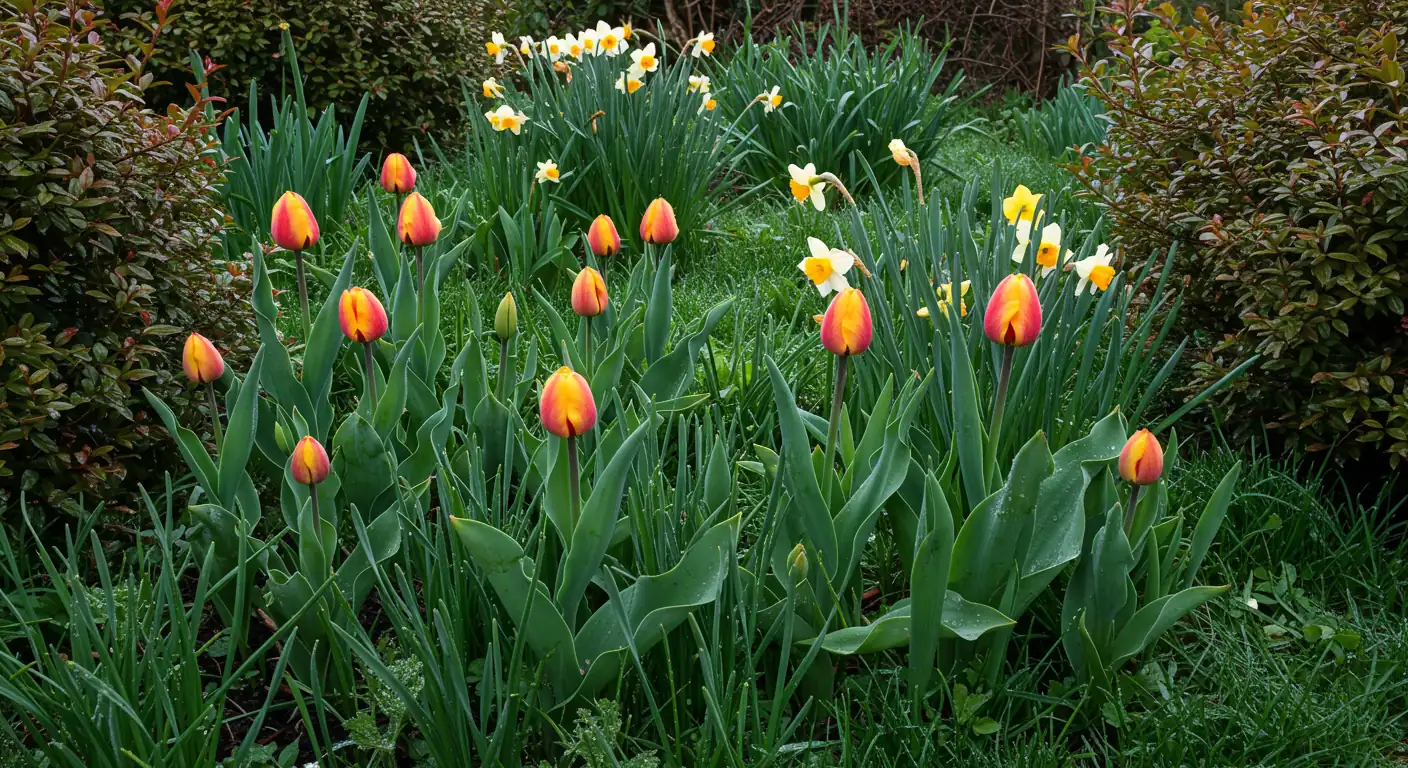
But just as we catch our breath, the infamous Ottawa summer starts knocking, promising heat waves and maybe even a dry spell or two. Living so close to the lovely Rideau River gives Kars its unique charm, but it can also mean specific conditions for our plants – think humidity mixing with that intense summer sun! You've invested time, sweat, and maybe a few aching muscles into your beautiful landscaping. We want to help protect that investment from wilting under pressure (we've all been there!).
It's a similar story for gardeners in nearby Manotick; keeping those blooms happy through July and August isn't always easy! Don't worry, though. We're here with friendly, practical advice to help your Kars garden thrive, not just survive, the sunny, steamy months ahead. You can also find information about our services on our Google My Business page. Let's keep that glorious garden going strong!
Decoding the Ottawa Summer: What Your New Plants Are Up Against
Okay, Kars neighbours, let's talk summer! Your spring gardening efforts have things looking fantastic, but Ottawa summers have a unique personality, especially for those tender, new plants you just put in. Think of your new perennials, shrubs, or trees like rookies on their first big game day – they need a little extra support because they're facing some tough opponents.
So, what exactly are your new green additions up against?
- The Heat is On: Ottawa can swing from pleasant spring days to sizzling summer heat pretty quickly. These sudden temperature spikes are tough on established plants, but they're especially stressful for new ones whose root systems aren't fully developed yet. They simply can't draw water fast enough to keep up when the heat cranks up.
- Humidity Hustle: That lovely proximity to the Rideau River? It can contribute to sticky, humid air. While some plants love humidity, high levels can slow down transpiration (how plants "breathe" and cool themselves) and sometimes encourage fungal diseases on vulnerable newcomers.
- Water: Too Much or Too Little: Our summer rainfall can be unpredictable. We might get weeks with barely a drop, leading to drought stress for shallow-rooted new plants. Then, bam! A massive downpour can hit, potentially waterlogging soil or even washing away mulch and soil, especially in areas with less ground cover. Check City of Ottawa water conservation guidelines for current restrictions.
- Soil Surprises: Depending on your specific spot in Kars, or nearby areas like Greely and Osgoode known for their mix of sand and clay, your soil behaves differently. Sandy soil drains water very quickly (hello, thirsty plants!), while heavy clay holds water longer but can bake hard and crack in dry spells, making it tough for roots to penetrate. Understanding your local conditions is key, much like knowing your yard's unique spots as discussed in Kars Winter Garden Protection and Microclimate Tips and considering Osgoode Garden Microclimates and Winter Protection.
Key Insight: New plantings are especially vulnerable in summer because their root systems haven't fully developed to cope with heat, inconsistent water, and specific Ottawa soil conditions.
Why is this extra hard on new plantings? Because their roots haven't had time to spread deep and wide to find moisture and anchor themselves. They're still recovering from transplant shock and haven't built up the energy reserves of their older neighbours. Choosing the right plant for the right spot helps, similar to how selecting Embrun Spring Rabbit-Resistant Plants for Garden Protection minimizes other types of garden stress. Healthy summer growth also impacts how well plants handle other seasons, influencing tasks like Osgoode Fall Tree Pruning Before Winter.
It might sound like a lot, but don't worry! Knowing the challenges is the first step. If keeping up with summer demands feels like too much, remember our Landscaping and Garden Maintenance Services are here to help your Kars garden thrive. You can also find specific services like City Garden Maintenance Service if you are closer to central Ottawa.
Water Wisely: Quenching Thirst Without Drowning Roots
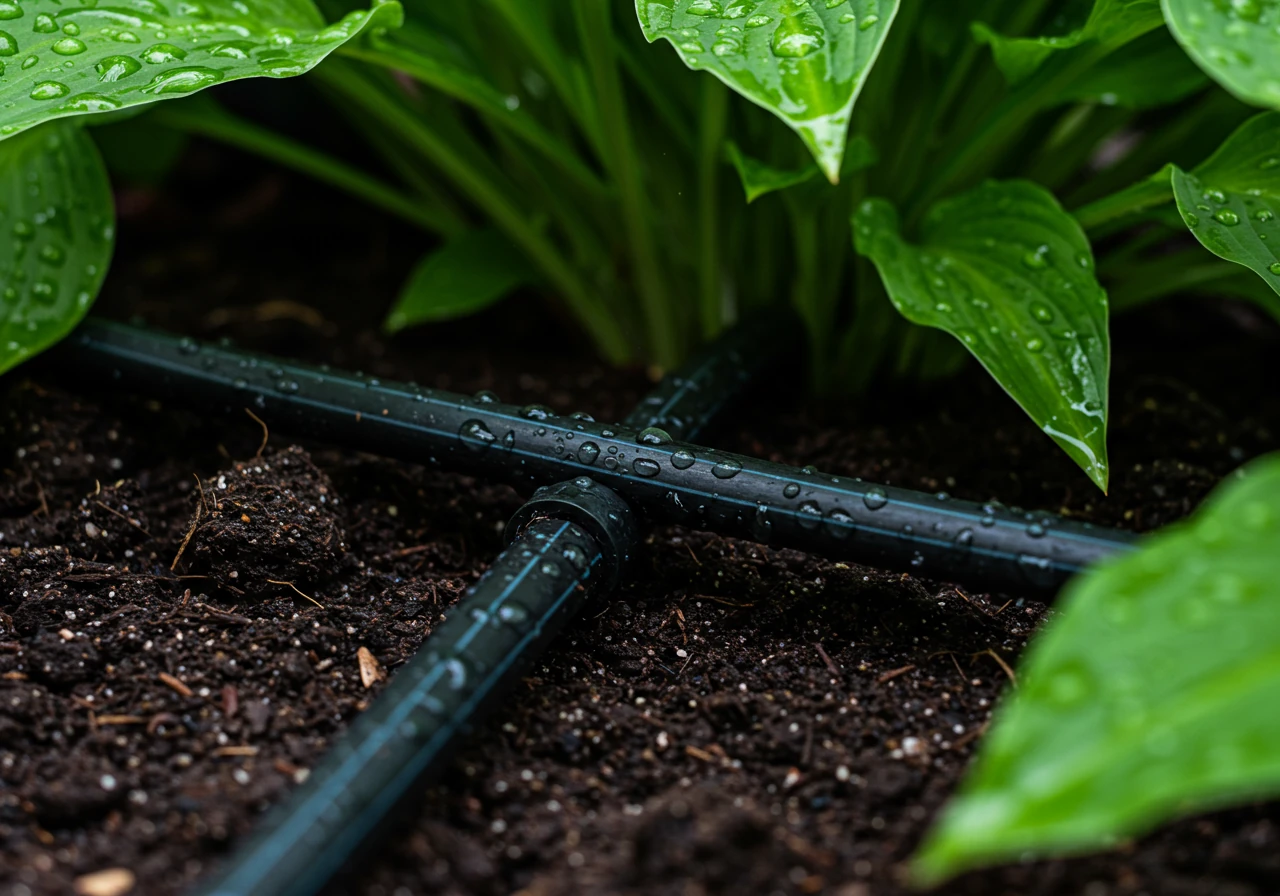
Okay, let's talk water! Your beautiful new plants are thirsty, especially during an Ottawa summer heatwave. But hold your garden hoses! More water isn't always better. Drenching your plants constantly is like trying to drink from a firehose – overwhelming and definitely not pleasant for their roots. We want to quench their thirst properly, not accidentally send them swimming with the fishes (or, you know, drown their roots).
The golden rule, especially for new perennials, shrubs, and trees settling into their Kars home, is deep and infrequent watering. Think about it: light, frequent sprinkles only wet the top inch or so of soil. This encourages shallow, lazy roots that stay near the surface and panic at the first sign of a dry spell. Watering deeply, but less often, forces those roots to dig down deep searching for moisture. This builds a stronger, more resilient plant that's better equipped to handle dry conditions. It's like fitness training for roots!
How Much is Enough? The Trusty Finger Test!
Forget fancy gadgets. The best way to know if your plant needs a drink is the good old finger test. Stick your finger about two inches (around your second knuckle) into the soil near the plant's base, but not right against the stem.
- If it feels dry at that depth, it's time to water.
- If it's still damp, hold off for another day or two.
For brand new plantings, you'll check more often, maybe daily for the first week, especially during hot weather. As they establish, you can gradually reduce the frequency.
Hand Watering (Can or Wand)
Great for targeted watering of new additions or containers.
Pros: You control exactly where the water goes.
Cons: Can be time-consuming if you have many plants.
Best For: New individual plants, container gardens.
Cost: Low (just your time and water bill).
Remember to water the base of the plant, aiming for the soil over the root zone, not the leaves. This reduces water lost to evaporation and helps prevent leaf diseases.
Soaker Hoses / Drip Irrigation
Excellent choices for water efficiency. These systems deliver water slowly and directly to the root zone where it's needed most.
Pros: Very water-wise, minimizes evaporation and runoff, less work once set up.
Cons: Initial setup cost and time, potential for clogging (especially in areas with harder water).
Best For: Garden beds, vegetable patches, rows of shrubs or hedges.
Cost: Moderate to High initially.
Ensuring these systems work well often starts with a tidy space; efficient watering is part of overall yard health managed through services like Comprehensive Property Clean Up.
When to Water & Conservation
Be an Early Bird! The absolute best time to water is early in the morning (think before 9 AM). The air is cooler, so less water evaporates before it can soak into the soil. This also allows plant leaves plenty of time to dry out during the day, reducing the risk of fungal diseases.
Water Conservation Wisdom:
- Rain Barrels: Collect free, naturally soft water that your plants will love. Find resources from groups like the Rideau Valley Conservation Authority.
- Mulch is Your Friend: A 2-3 inch layer of organic mulch helps keep the soil cool and retain moisture.
- Water Where it Counts: Avoid sprinklers that douse sidewalks or driveways. Direct water to the plant's root zone. This is crucial for establishing thirsty new lawns from Professional Sod Installation. For homeowners in communities like Winchester preparing for efficient summer watering, our Winchester Garden Clean Up Service can help prepare your beds.
Keeping garden beds clear also ensures water reaches your plants, not unwanted guests – a task our City Garden Clean Up Service can certainly handle.
Simple Steps for Watering New Perennials:
- Check First: Always do the finger test before watering.
- Soak Deeply: Water slowly and thoroughly around the base until you're confident the soil is moist several inches down. Use a gentle stream.
- Let it Absorb: Allow the water to soak in fully. Avoid creating standing puddles.
- Monitor & Repeat: Check the soil again in a day or two (for very new plants) or potentially longer (as plants establish) and only water again when the soil starts to feel dry at that 2-inch depth.
Keeping your plants properly hydrated without waterlogging them is a balancing act, but it's key to a lush, happy garden all summer long. If juggling watering schedules along with everything else feels like too much, remember that professional help is available. Explore our range of Landscaping and Garden Maintenance Services – we're always happy to lend a hand! Or simply check our Thank You page after contacting us.
Mulch More, Worry Less: The Protective Blanket Your Garden Needs
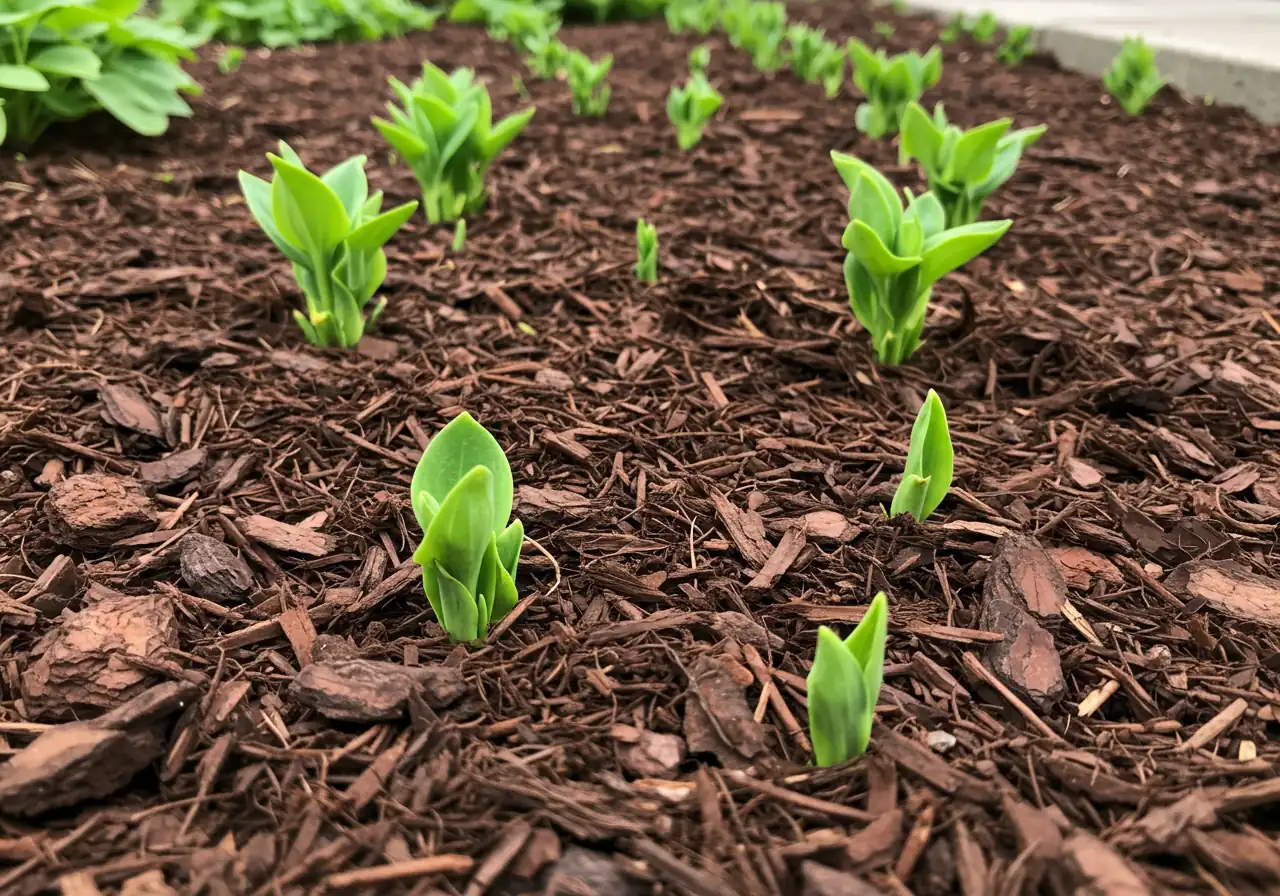
Think of mulch as the superhero cape your garden wears – okay, maybe more like a cozy, protective blanket. But it really does wonders, especially for those lovely new plants trying to settle into their Kars or nearby Richmond homes during a hot Ottawa summer! Applying a layer of mulch is one of the simplest, most effective things you can do for your garden beds, saving you time, water, and worry. It’s like giving your plants a cool drink and a weed-repelling shield all in one.
So, what magic does this blanket perform?
- Moisture Lock-In: Mulch acts like a lid on your soil, slowing down evaporation. This means the water you do apply stays where the roots need it longer, reducing your watering chores and conserving water – a big win!
- Weed Warrior: A good layer of mulch blocks sunlight from reaching weed seeds, making it much harder for them to sprout. Fewer weeds mean less competition for your plants and less back-breaking work for you. Hooray! Preparing the beds properly before mulching is key; a thorough weeding makes the mulch far more effective, a task often included in a Comprehensive Property Clean Up service, including options like our Metcalf Property Cleanup Service.
- Temperature Tamer: Mulch insulates the soil, keeping roots cooler during scorching summer days and warmer during cool nights. This stability helps reduce stress on your plants, especially the new ones.
- Soil Booster (Organic Mulches): As organic mulches like shredded bark or compost break down, they enrich the soil with valuable nutrients and improve its structure. It's a slow-release fertilizer and soil conditioner, all included! Consider options during Material Selection.
Choosing Your Mulch:
In our Ottawa climate, organic mulches are fantastic choices. You can often find good quality shredded bark (cedar or pine are popular), wood chips, or even compost readily available at garden centers near Metcalfe and surrounding areas. Cedar mulch has the added bonus of being somewhat pest-repellent.
How to Mulch Like a Pro:
- Weed First: Clear the garden bed of existing weeds. Seriously, don't skip this step! You don’t want to give weeds a cozy blanket too. This kind of prep work ensures the best results, similar to the attention given during our Marionville Garden Clean Up Service.
- Apply the Right Amount: Spread your chosen mulch evenly over the soil surface, aiming for a depth of about 2-3 inches (5-7.5 cm). Too thin, and it won't suppress weeds or hold moisture well. Too thick, and it can prevent water and air from reaching the soil.
- Give Plants Breathing Room: Crucially, pull the mulch back an inch or two from the base of your plants (stems of perennials, flowers, and tree/shrub trunks). Piling mulch right against the stems can trap moisture, inviting rot and pests. Think donut, not volcano!
- Top Up Annually: Organic mulches decompose over time, so plan to replenish the layer each spring to maintain the ideal depth. Our Mulching and Edging services can handle this for you.
Mulching is a vital step after putting in new plants, complementing services like our Expert Garden Installation Solutions by protecting your investment right from the start. It's also a smart practice that works hand-in-hand with good Professional Lawn Care Services – healthy garden beds beside a healthy lawn create stunning curb appeal.
Feeling overwhelmed by mulch choices or the work involved? Don't hesitate to Contact Clean Yards Landscaping Experts – we're happy to help you choose and apply the perfect protective blanket for your garden! Please review our Terms and Conditions and Privacy Policy regarding service agreements.
Summer Scoundrels: Identifying and Managing Pests & Diseases
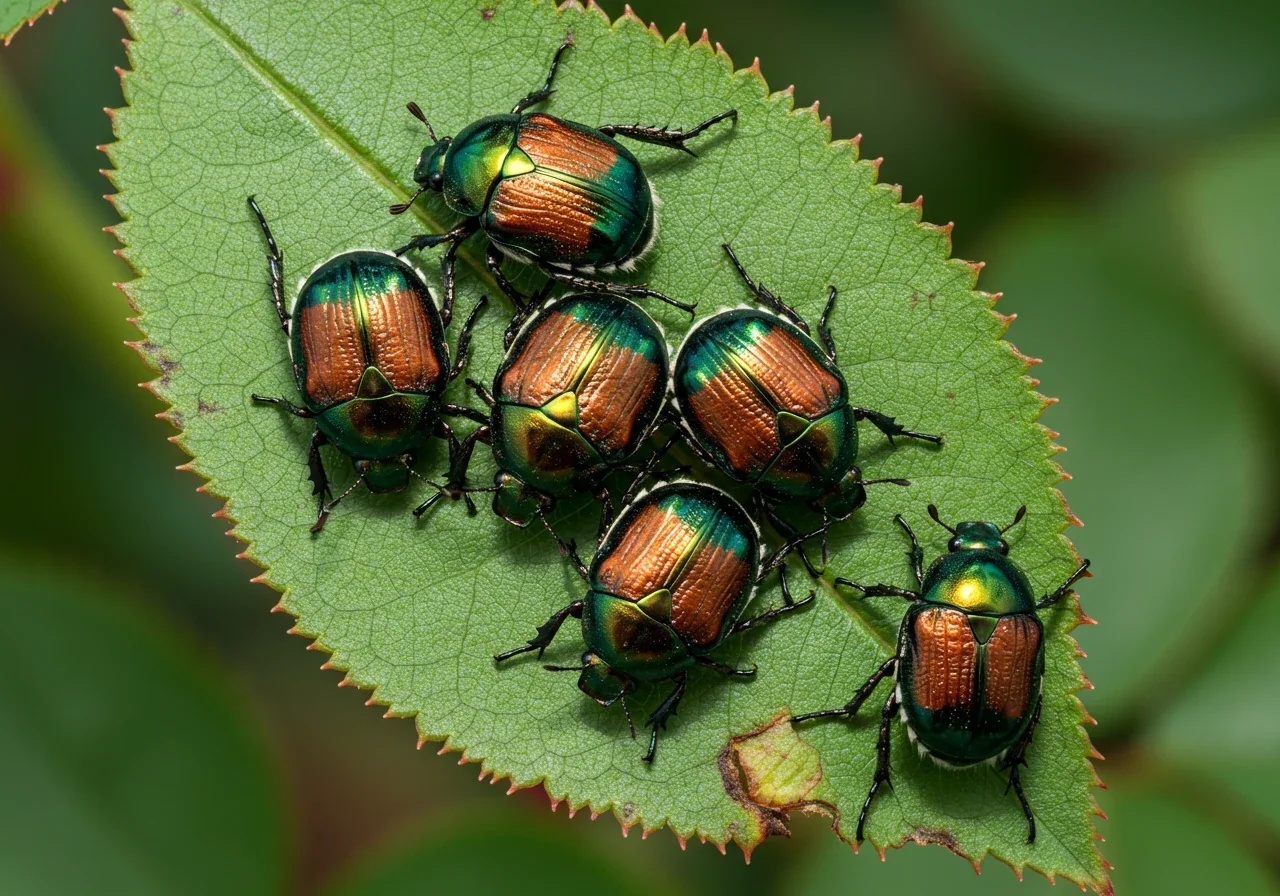
Ah, summer! Sunshine, blooms... and unfortunately, a few uninvited guests trying to spoil the party. Meet the "Summer Scoundrels" – the common pests and diseases that think your lovely Ottawa garden is their personal all-you-can-eat buffet. Don't throw in the trowel just yet! Spotting and dealing with these freeloaders early is key, especially for your new plants that are still finding their feet (or roots!). Keeping your garden healthy helps prevent these issues from taking hold in the first place.
Let's meet a couple of the usual suspects you might find bothering gardens from Barrhaven to the outskirts near Vernon:
- Japanese Beetles: These metallic green-and-copper beetles are pretty easy to spot. Unfortunately, they're also voracious eaters, skeletonizing leaves (eating the tissue between the veins) on hundreds of plant types, especially roses, grapes, hibiscus, and even some trees. They love to party in groups, so where you see one, more are likely nearby.
- Powdery Mildew: Does it look like someone sprinkled talcum powder or flour on your plant leaves, especially on plants like phlox, bee balm, lilacs, or squash? That's likely powdery mildew, a common fungal disease that thrives in warm, humid conditions with poor air circulation. While usually not fatal, it stresses plants, looks unsightly, and can reduce flowering and growth.
Fighting Smarter, Not Harder: Integrated Pest Management (IPM)
Before you imagine waging all-out chemical warfare, let's talk about a smarter, friendlier approach called Integrated Pest Management (IPM). It sounds fancy, but it just means being a good garden detective. IPM focuses on understanding the problem and using the least harmful solutions first. Think of it like this:
- Observe: Know thy enemy! Identify the pest or disease correctly. Get advice from resources like the Ontario IPM Council or local horticultural groups.
- Prevention: Healthy plants resist pests better. Use good gardening practices (watering correctly, mulching).
- Action (Least Harmful First): Try physical removal (like hand-picking beetles) or cultural changes (like pruning for air circulation).
- Stronger Measures (If Needed): Consider targeted, eco-friendly sprays (like insecticidal soap) before resorting to harsher chemicals, which should always be a last resort. Our team culture, which you can explore on the Clean Yards About Us page, embraces responsible landscaping practices.
Eco-Friendly Tip: For Japanese Beetles, hand-pick them into soapy water in the cool morning. Avoid pheromone traps, which can attract more beetles to your yard.
Practical, Eco-Friendly Tips:
- For Japanese Beetles: Your best tool is often a jar of soapy water! In the cool early morning, these beetles are sluggish. Go out and flick 'em into the jar. It’s strangely satisfying! *Avoid* those yellow pheromone traps – studies show they often attract more beetles to your yard than they actually catch.
- For Powdery Mildew: Airflow is key! Prune crowded plants to let the breeze through. Water the soil directly, keeping leaves dry. Remove and dispose of badly infected leaves (don't compost them!). Good garden hygiene, like that provided by our Ottawa Garden Clean Up Service, can help reduce fungal spores hanging around. Keeping planting areas clear of debris, a core task of our Marionville Garden Clean Up Service or Metcalf Garden Clean Up Service, also limits pest hiding spots.
Your Weekly Plant Health Check-Up:
Make it a relaxing ritual! Spend 5-10 minutes each week inspecting your plants:
- Take a slow walk around your garden beds.
- Look closely at leaves – top and bottom! Peek under them; pests love to hide.
- Check stems and flowers too.
- Notice anything unusual? Holes, spots, sticky stuff, fuzzy patches, wilting, or actual creepy crawlies?
- Catching problems when they're small makes them *much* easier to manage. Vigilance leads to vibrant gardens, as seen in many of our Clean Yards Garden Transformations.
Sometimes, even with the best intentions, pests or diseases can feel overwhelming. If you're struggling to identify a problem or find a solution that works, professional help is available. Getting an expert opinion can save you time and frustration – feel free to use our Estimate and Feedback Form to describe the issue and request advice or a quote for services.
Feeding for Endurance: The Right Nutrients for Summer Survival
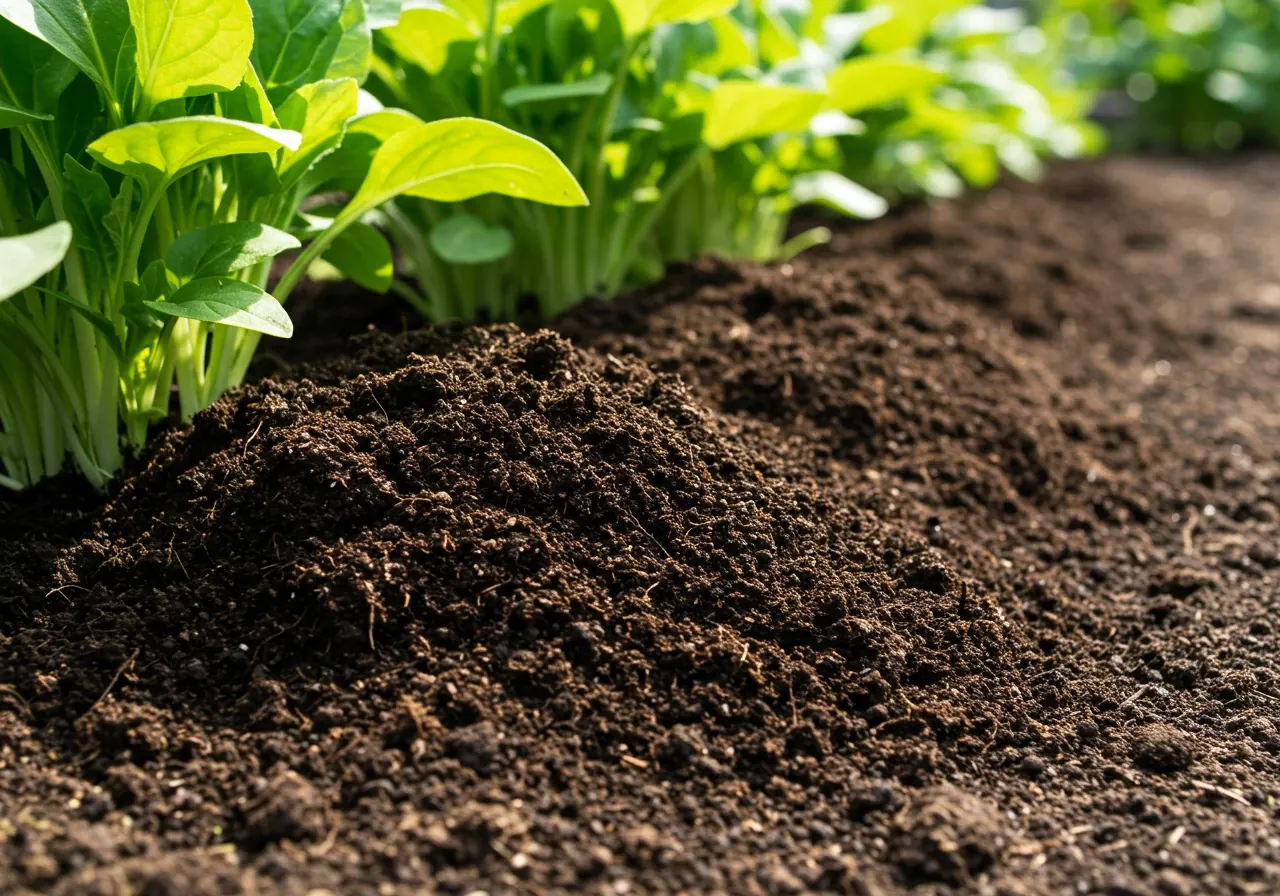
Okay, team garden! Your new plants have settled in, survived the spring rush, and now face the summer marathon. Just like us needing the right snacks for energy on a hot Ottawa day, your plants need the right nutrients for summer endurance. But hold on – feeding them now is different than that initial spring boost. Think of it like training for a race: spring was the energetic start, summer is all about pacing for the long haul.
In spring, we often give plants a nudge with fertilizer to encourage lots of leafy growth and strong roots. Think of it as their morning coffee! But in the summer heat, pushing too much new, tender growth can actually stress them out. That lush foliage requires more water, making plants more vulnerable during dry spells. It’s like asking someone to sprint a marathon – not a great idea! Summer feeding is more about sustained energy and resilience, helping them cope with heat and potential drought, especially in areas with varying soil types like around Greely. That’s why good Soil Preparation and Amendments done earlier pays off now, setting the stage for efficient nutrient uptake.
So, what's the best summer meal plan for your landscaping additions? Generally, less is more. If you fertilized well in the spring, many established plants might not need much extra food during peak summer. For new plantings or those showing signs of needing a boost, opt for slow-release granular fertilizers or organic options like compost tea or top-dressing with well-rotted compost. These release nutrients gradually, feeding plants steadily without a sudden, stressful surge. Think balanced meal, not sugary energy drink. Crucially, avoid heavy fertilizing, especially with quick-release liquids, during intense heat waves. This can "burn" roots and foliage, adding injury to heat stress.
Summer Feeding Rule: Prioritize slow-release or organic options if feeding is necessary. Avoid high-nitrogen or quick-release fertilizers during peak heat to prevent stressing plants.
Are your plants looking a bit pale or sluggish? While yellowing leaves can indicate a nutrient deficiency, always check your watering habits and look for pests first before reaching for the fertilizer bag. Sometimes, ensuring the soil isn't compacted and is free of excessive leaf litter or debris allows existing nutrients to be accessed better – something a regular Ottawa Garden Clean Up Service helps maintain. Keeping the area tidy, much like the focus of our Marionville Property Cleanup Service or City Property Cleanup Service, ensures inputs like water and any necessary fertilizer actually reach the roots effectively.
Consistent feeding, when needed, is part of a bigger picture of plant health. It complements other essential tasks within a good Garden Maintenance routine. If you’re unsure about your plants’ specific needs or interpreting their signals, our City Garden Maintenance Service team can assess and provide tailored advice for keeping your green friends happily and appropriately fed all summer long. Remember, the goal is steady endurance, not a frantic sprint!
Common Summer Garden Challenges (Illustrative)
Simplified Summer Garden Care Timeline
Early Summer (June)
Monitor new plantings closely for water needs. Apply mulch if not done yet. Watch for early pests like aphids.
Mid-Summer (July)
Peak heat arrives! Consistent deep watering is crucial. Look out for Japanese Beetles. Deadhead spent flowers.
Late Summer (August)
Continue vigilant watering & pest checks. Assess if any slow-release feeding is needed. Start thinking about fall cleanup tasks like those offered by Ottawa Property Cleanup Service.
Ongoing
Weekly checks for moisture, pests, and diseases. Consistent weeding. Enjoy your beautiful garden!
Summer Survival Kit: Quick Tips for Thriving Gardens
Alright, fellow Ottawa gardeners, the summer sun is high, and things are heating up! Your garden has been looking lovely, but now comes the real test of endurance. Don't sweat it (well, maybe a little – it is summer!), because we've put together a "Summer Survival Kit" of quick answers to common questions. Think of this as your cheat sheet to keep those plants happy and thriving, whether you're in Metcalfe, Barrhaven, or anywhere else under our sunny skies. Need a hand with general tidiness? Check our City Yard Cleanup Service.
Question: My plants look thirsty in the heat! Should I just water them every day?
Answer: Not necessarily! Overwatering can be just as bad as underwatering. The best trick is the trusty finger test: stick your finger about two inches into the soil near the plant base. If it feels dry, it's time for a drink. If it's still damp, hold off. When you do water, water deeply to encourage strong, deep roots, rather than giving light daily sprinkles. Aim for early morning watering so the leaves dry out during the day, reducing disease risk. Remember, consistent, smart watering is a cornerstone of good garden care.
Question: I keep hearing about mulch. Is it really worth the effort in the summer?
Answer: Absolutely, positively, YES! Think of mulch as your garden's best friend during summer. A 2-3 inch layer of organic mulch (like shredded bark or wood chips) does three amazing things: it keeps the soil cooler, locks in moisture so you water less, and dramatically suppresses weeds. Just remember to pull it back an inch or so from plant stems – no mulch volcanoes, please! Choosing the right type is important; explore options through resources about Thoughtful Landscaping Material Selection. It makes a huge difference in keeping your garden beds healthy and looking sharp.
Question: Ugh, pests! Something’s munching on my leaves. What’s a quick, easy way to deal with them?
Answer: First step: play detective! Figure out what you're dealing with. For common culprits like Japanese Beetles, the most satisfying (and eco-friendly) method is often knocking them into a jar of soapy water in the early morning when they're slow. For issues like powdery mildew, improving air circulation by pruning crowded stems can help immensely. Often, keeping your garden and yard tidy reduces hiding spots for pests. Regular upkeep, like the services offered by our Metcalfe Yard Cleanup Service, can make a surprising difference in pest control. For city dwellers, maintaining a clean space overall with a City Property Cleanup Service also discourages unwanted critters.
Question: Should I keep feeding my plants with fertilizer throughout the summer?
Answer: Easy does it! While plants need nutrients, pushing lots of new growth with heavy fertilizer during intense summer heat can actually stress them out more, as new growth demands more water. If you fertilized well in spring, many plants are fine. If needed, opt for slow-release granular options or organic amendments like compost, applied according to package directions. Avoid fertilizing right before or during a heatwave. Healthy, well-maintained soil is often the best "food" source.
Question: The weeds are relentless! How can I keep them from taking over my beautiful garden beds?
Answer: Your number one weapon against weeds is... mulch! (See? We told you it was important!). A good mulch layer smothers many weed seeds. Beyond that, the key is persistence. Pull weeds when they're small and before they set seed – it saves much bigger headaches later. Staying on top of general property tidiness also helps prevent weeds from establishing in surrounding areas and spreading into your beds. This is where services like a thorough Metcalfe Property Cleanup Service can indirectly benefit your garden's battle against weeds. Consistent weeding is a fundamental part of effective Garden Maintenance, ensuring your plants get the resources they need, not the weeds!
Keeping these quick tips in mind will go a long way towards ensuring your Ottawa garden doesn't just survive the summer, but truly thrives! Happy gardening!
Your Kars Summer Garden Questions Answered (FAQ)
Here are some quick answers to common questions we hear from Kars gardeners (and neighbours in places like Manotick and Greely!) about keeping things green and gorgeous during the demanding Ottawa summer.
Great question! Soil type definitely changes the game. Heavy clay needs slow, deep watering less often – let it really soak in. Sandy soil drains fast, so you'll need to water more frequently but still deeply. Always check the soil moisture 2 inches down before watering, regardless of soil type, to avoid soggy roots. Understanding your soil is key to smart gardening.
Absolutely not, it's never too late for mulch magic! Just weed the garden bed thoroughly first, then apply a 2-3 inch layer, keeping it away from plant stems. It will still help conserve moisture, cool the soil, and suppress weeds, making your summer landscaping tasks easier. Check out professional Mulching and Edging Services if you need a hand getting it done right.
Ah yes, containers are thirstier beasts! You'll likely need to water them daily, maybe even twice daily during real scorchers. The soil volume is small and exposed, so it dries quickly. Always check with your finger – if the top inch is dry, give them a good soak until water runs out the bottom. Don't let them wilt completely!
Keep an eye out for aphids (tiny pear-shaped insects, often on new growth), slugs and snails (especially after rain, look for slime trails!), and spider mites (more common in hot, dry spells – look for fine webbing). Keeping your yard tidy helps reduce hiding spots. Our general Ottawa Yard Cleanup Service can help minimize habitats for these unwanted guests. Consider also the Marionville Yard Cleanup Service for specific local needs.
Good instinct! This is called "deadheading" or cutting back. For many perennials (like catmint or salvia), trimming off spent flowers encourages tidiness and sometimes even a second bloom! You can cut back leggy stems partway to promote bushier growth. It keeps things looking sharp, much like how our neighbours might use the Winchester Garden Clean Up Service to maintain neat gardens.
It certainly can! Stressed lawns often invite weeds, which can easily creep into your beds. Pests might also move between stressed grass and healthier garden plants. Keeping lawn edges neat and the overall property tidy helps prevent this crossover. Consider how comprehensive care, like a City Property Cleanup Service or Ottawa Property Cleanup Service, contributes to the health of both lawn and garden areas.
Conclusion: Enjoy Your Thriving Kars Garden All Summer Long!
Whew! You made it through spring planting, Kars friends, and your gardening efforts look amazing. Now, keeping that beauty going through the Ottawa summer doesn't have to feel like a chore! By focusing on a few key strategies, you can protect that wonderful investment you've made in your landscaping.
Remember the summer survival basics:
- Water wisely – deep and less often is usually better than a daily sprinkle.
- Mulch generously – it’s your garden's best friend for moisture and weed control.
- Stay watchful – catch pests or diseases early before they cause big trouble.
- Feed smart – give nutrients or fertilizer for endurance, not forced growth, especially considering your local soil conditions.
Putting these simple tips into practice means less stress for you and your plants. Instead of battling wilted wonders, you can spend more time simply enjoying the colour, life, and beauty your garden beds bring to your home all season long. Imagine relaxing evenings surrounded by happy, thriving plants – that's the goal!
If summer schedules get hectic, or if a gardening challenge feels overwhelming, don't hesitate to reach out. Our professional team offers complete landscaping and maintenance support throughout Kars, Kenmore, Barrhaven, Nepean, and surrounding areas like Marionville. Let us handle the hard work so you can relax!

